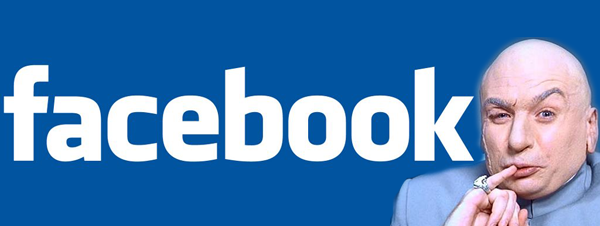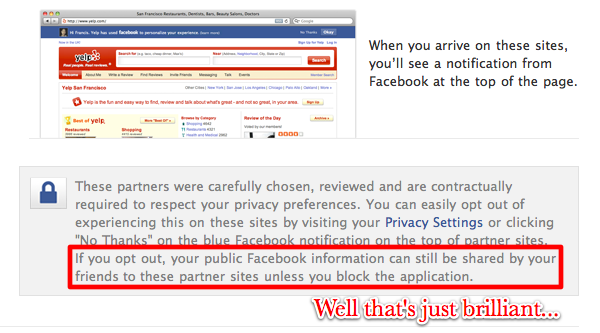“Do no evil.” That was the now famous philosophy that Google portrayed to the world, claiming that a business doesn’t need to be evil to be effective and make money. It sounds great, really. But we are left wondering what Facebook’s motto would look like: “What they don’t know won’t hurt them”?
We regularly accept the fact that businesses have one goal: make money. If they are not making money, then they can’t survive. That’s a given. So we typically expect to be bombarded with advertising (granted, Facebook’s advertising is horrible in more ways than one), affiliate offers, promotional material, and other types of content that most people tend to ignore. People just deal with it.
That isn’t the issue with Facebook. Unfortunately, it is far, far worse than that.
This problem, in people’s and consumer group’s eyes, is that Facebook is taking all of this personal information that users are entering into the site (sometimes extremely personal information) and using it — without knowledge of the general public — to fulfill the company’s agenda.
The Confusion
Facebook has done this previously by changing their privacy controls, making it difficult for users to understand if information is public or private. The most notable example is when Facebook made a huge change to its privacy settings by popping up a notification asking users about changes to their privacy settings. I, like many, clicked right through this dialog without reading anything on the page, thinking that Facebook had retained all my previous privacy settings. But as some of us know all too well, that wasn’t the case.
Instead, I — like many others — ended up sharing most of my information with the world and not realizing it until several days later. Therefore, it is not far fetched to believe that a significant portion of the user-base on Facebook is exposing all of their information while believing it is actually private. Actually, there are numerous examples of how users have gotten into big trouble by sharing information that they thought was public.
Yet Facebook has done little, if anything, to make amends.
Confusion aside, third-party websites (sites that you visit outside of Facebook) haven’t had access to this information. For example, Webdesigner Depot can’t assume that I am James Mowery when I visit that site. There is no way to link that name to my IP address, unless you get a court order — this is a good thing.
But this is no longer true. And that is a very bad thing!
The “Uh Oh”
Facebook has gone ahead and decided that a select group of third-party websites should have access to your data, making it more difficult than necessary (and more time consuming than most people will deal with). Facebook calls this hidden gem Instant Personalization, and it could change the way we browse the Web in the future.
Now, when a user visit a site like Pandora, Yelp, or Docs.com (owned by Microsoft), Facebook will insist on sharing that user’s Facebook profile with that website, fully identifying a Facebook user to that to the site, potentially resulting in a significant violation of privacy.
You can opt out — clicking “no thanks” on the top of the page prevents that data transaction from taking place, but, as you will soon learn, it isn’t that cut and dry, and these sites can still get your data.
You see, Facebook has yet another loophole in where your friends can share all of your public information with these sites as well. So when a friend of yours on Facebook visits one of these Instant Personalization sites and agrees to share their data, they also share your personal data with the site as well, which is quite silly and, perhaps, dangerous.
Does this mean that a friend is potentially sharing a their friend’s locations, phone numbers, e-mail addresses, and more with all of these third party sites? I’m not sure what information is being shared exactly, but it doesn’t sound good either way. And if this information is being shared, isn’t this inviting companies to collect phone numbers and e-mail addresses and sell them to marketing companies? The thought alone is ridiculous!
The only way to truly ensure that these sites will not have access to your information is to block the application entirely. As such, it is forcing the user to go through the effort to find the application (which a particularly user might never wanted to use in the first place), block it, and then opt out of any Instant Personalization sites. It’s a lot of work just to protect your data from leaking out to third parties, wouldn’t you say?
This system is potentially dangerous, and while I freely share my own information around the Web, there is a different expectation with Facebook than, say, Twitter. There are things on Facebook that I would like to keep private, but lately it feels like Facebook is doing everything it can to convince me and its users to open up and share our information with the world.
It’s making many users uneasy about Facebook. And it has gotten to the point where some well-known throughout the tech and social media industries have decided to abandon Facebook altogether.
The Future
While a few big names abandoning Facebook probably won’t stump the site’s growth anytime, it could provide opportunities for competition to step in. Those users who are always on the edge, looking for the latest and greatest thing, are likely itching for a Facebook killer to come along, and who could blame them, especially with Facebook’s track record for security and privacy.
That said, I’m certain that Facebook’s demise would have to be more about another site being vastly superior than Facebook instead of Facebook being evil. The whole point of Facebook is connecting with your friends, and no other website does a better job of doing just that at this current point in time.
Not to mention that people seemingly don’t care much about their privacy anymore.
Until then, Facebook will continue to dominate social media while privacy issues will continue to circulate.
Yet I urge the company to tread cautiously. The warning signs are out there, and the company’s users could revolt at any moment — just look at how quickly things went bad for MySpace. It is clearly possible for some other company to come in and take away everything that Facebook has built up.





hopefully we’ll soon have some better alternatives.
Poke off.
“I, like many, clicked right through this dialog without reading anything on the page.
Here’s how to use Firefox’s Adblock Plus add-on to prevent any other Web site from accessing your Facebook info:
Great article, you’re now on my short list…
This just reinforces my standard policy regarding these public profiles: ALWAYS LIE LIE LIE. Just in case it’s cross-referenced, I tell the same lies everywhere. DOB, Full name, location, etc. Pick some slight variation, like add or subtract a digit or letter and apply it consistently.
Unfortunately, we can’t actually spoof our geolocation. Not without jailbreak hacks to our phones, anyway.
Giacomo
Great post James.
Facebook’s evil tendencies extend beyond privacy. Check this out at: